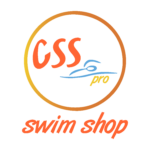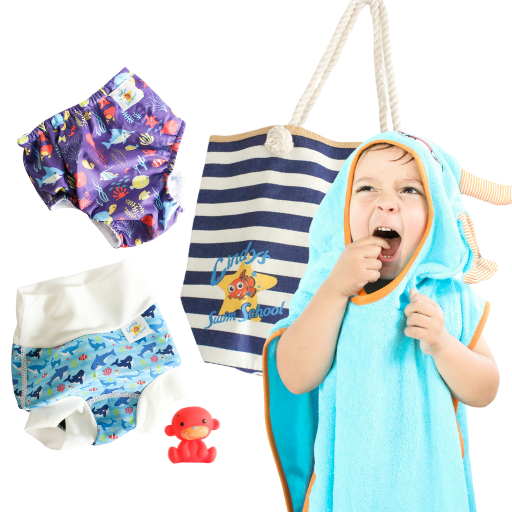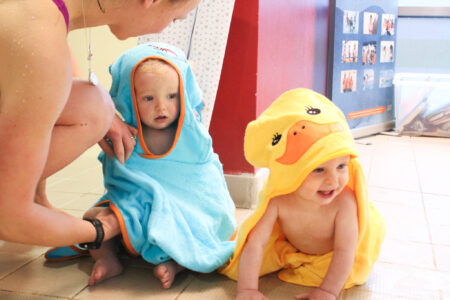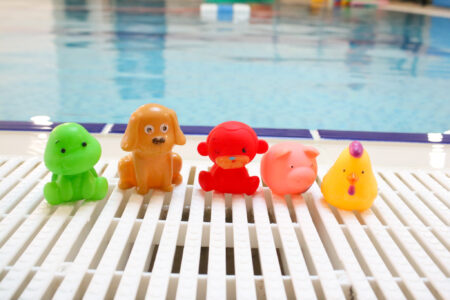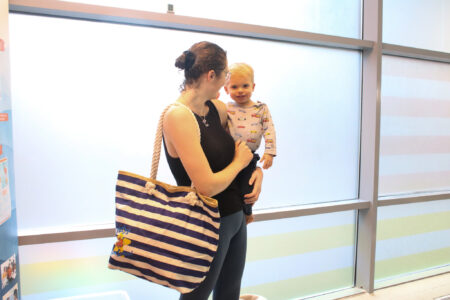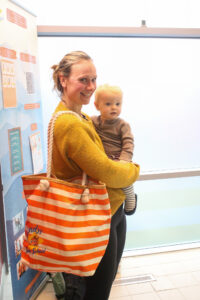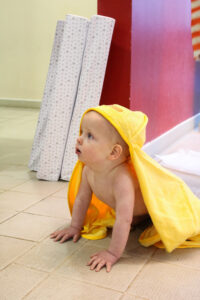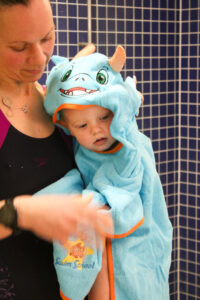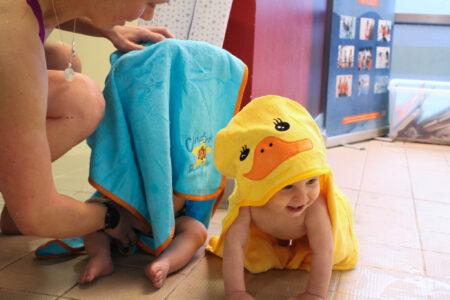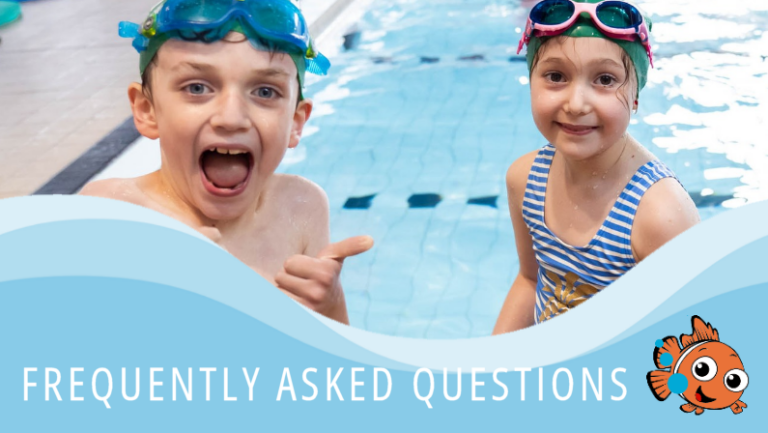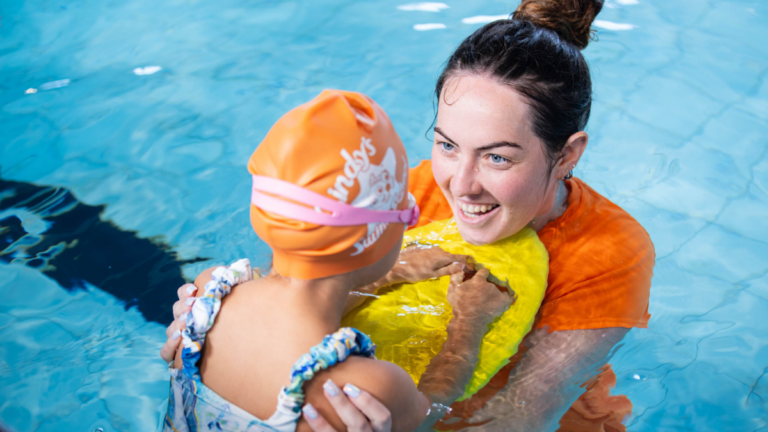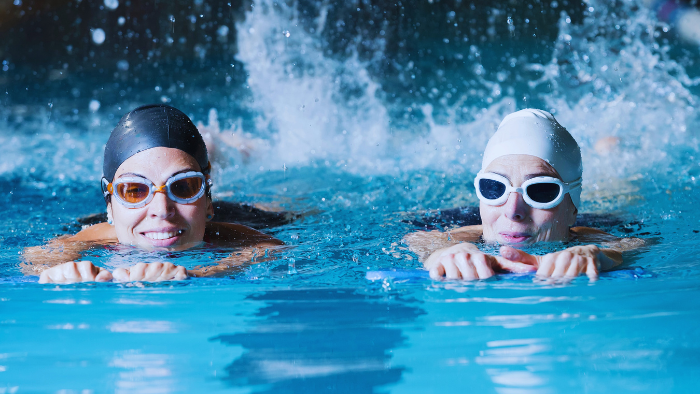When to take your baby swimming and other questions answered
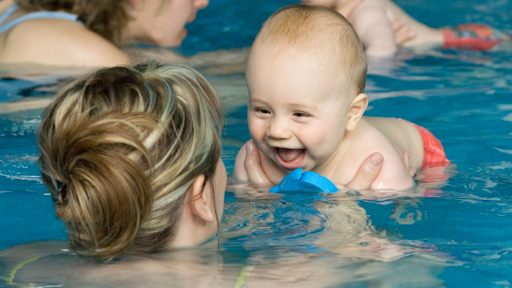
Frequently Asked Questions about Baby Swimming
Click the question to jump to our answer!
- What age can babies swim?
- Can newborn babies swim?
- Why start swimming lessons early?
- How warm should the swimming pool be?
- What should my baby wear?
- Can my baby swim with dry skin or eczema?
- Can my baby swim with reflux?
- What if my baby screams in their lesson?
- How long should babies stay in the water?
- How much do baby swimming lessons cost?
Parenthood is an amazing and intense learning experience, from the moment you fall pregnant to the day your child fledges the nest. It can feel overwhelming to know what to focus on in your little one’s early years! However, swimming lessons should be on your radar as one of the essentials to provide for your child. In this article I will explain why and (hopefully) answer all your questions about baby swimming lessons!
Why start swimming lessons early?
Aside from parent and baby swimming being a wonderful activity to do together, studies have shown that swimming lessons appear to improve children’s cognitive ability; in other words, children who start swimming from babies and pre-school are smarter than those who don’t.
The benefits of consistent swimming continue to have a massive impact on your child through adolescence into adulthood, by enhancing short- and long-term cognitive function, which provides wider transferable cognitive benefits to other aspects of their lives. In short, providing your child with consistent early years swimming lessons, will give them a huge boost later on in life in many different areas and for many years to come.
Swimming lessons can save your child’s life
While that is a pretty impressive reward for teaching your child how to swim from infancy, the biggest and most important reason that swimming is vital from as young as possible is because it is a lifesaving skill. Just this week there was another unfortunate drowning of a child in an English swimming pool. In the UK 84 children drowned in the last three years and nearly half of those were children under five – a very sad and completely preventable statistic. Is it worth the risk not to teach your child how to swim?
Now, many parents ask, what could my newborn possibly learn at four weeks old?? And our answer is a lot!
Can newborn babies swim?
Can newborn babies actually swim? We haven’t met one yet! But are they happy being supported and moved through warm water? Most of the time it’s a resounding yes!
A newborn up to three months old isn’t capable of blowing bubbles and kicking across the pool, but newborn swimming is brilliant in helping your little one’s muscles and joints loosen, after being cramped up inside mom’s tummy for so many months. The feeling of a warm wet surrounding is particularly calming to them, as it brings them back to what they know and feel safe in. With the right swimming programme, your baby will be guided through every developmental stage, learning things as they are ready along the way, whilst loosening up, gaining coordination and building muscles and confidence in their fun swimming lessons! Click for more questions answered about newborn swimming.
And as we have all experienced in our own learning journeys, repetition and layering are key to gaining a strong and confident understanding of whatever we learn. The same goes for babies, especially babies, as this is exactly how they have to learn everything!
When to take your baby swimming?
So, now that you are keen to take your baby swimming, when is the best time to take them? The answer to this question really depends on your preference and your baby. According to the NHS guidelines, there is no age limit on how old your baby must be to start swimming lessons. It is perfectly safe to take your baby swimming at any age, before or after vaccinations. We have taught some babies as young as a few weeks and they have been very happy in the water.
What age can babies swim by themselves?
What never ceases to amaze us at Cindy’s Swim School, is how much babies learn at such young ages! With consistent swimming lessons, we have had many 18 month olds swimming short distances independently and two year olds swimming ten metres unaided!
Although each baby is unique, most babies fall into developmental leaps, and usually make their leaps around the same age. If your little one has consistent swimming lessons from about two months, they should be able to swim even a short distance (one to two metres) by the time they are two years old.
Our programme is specifically designed to teach babies water safety from day one, which teaches them vital water safety skills such as monkey-walking to the steps, floating on their backs unaided, being submerged and popping on their backs unaided, and jumping in and turning around to find the wall. These and other water safety tips will be taught to your little one as they naturally develop the necessary gross and minor motor skills needed with which to do each exercise.
How warm should the swimming pool be?
Babies are very sensitive to changes in temperature, so all babies under six months should swim in pools of at least 30 degrees, babies from birth to three months should swim in warmer pools of at least 32 degrees. All our pools we have baby lessons in are at the recommended temperatures for your babies to swim in a warm and comforting pool. When babies become older though, going into toddler years and beyond, a slightly colder pool introduces them to a more realistic water temperature that they’re most likely to encounter at the beach and whilst on holiday at various pools. This also teaches them to be able to enjoy all types of water temperatures.
What should my baby wear while swimming?
To keep pools safe and clean for us all to swim, all babies are required to wear a neoprene nappy and a baby swim nappy to swim until they are toilet trained. This is to ensure that any oopsies are definitely caught before they enter the pool. You can purchase these and other items from our online shop.
Neoprene swim nappy
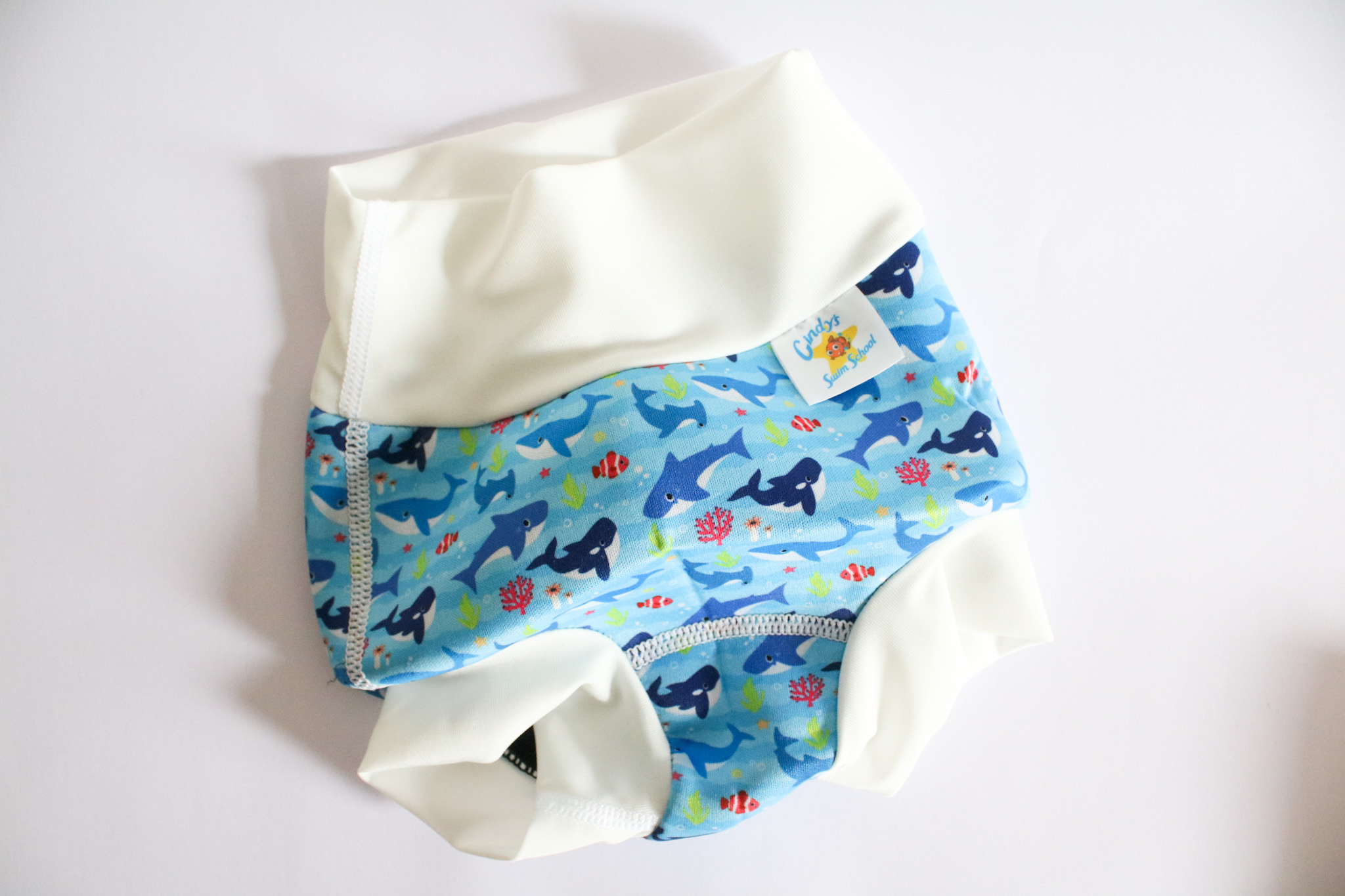
Both a neoprene swim nappy and a reusable swim nappy are required for each lesson. Wear the neoprene swim nappy over the top of a swim nappy.
£10.00
Reusable swim nappy
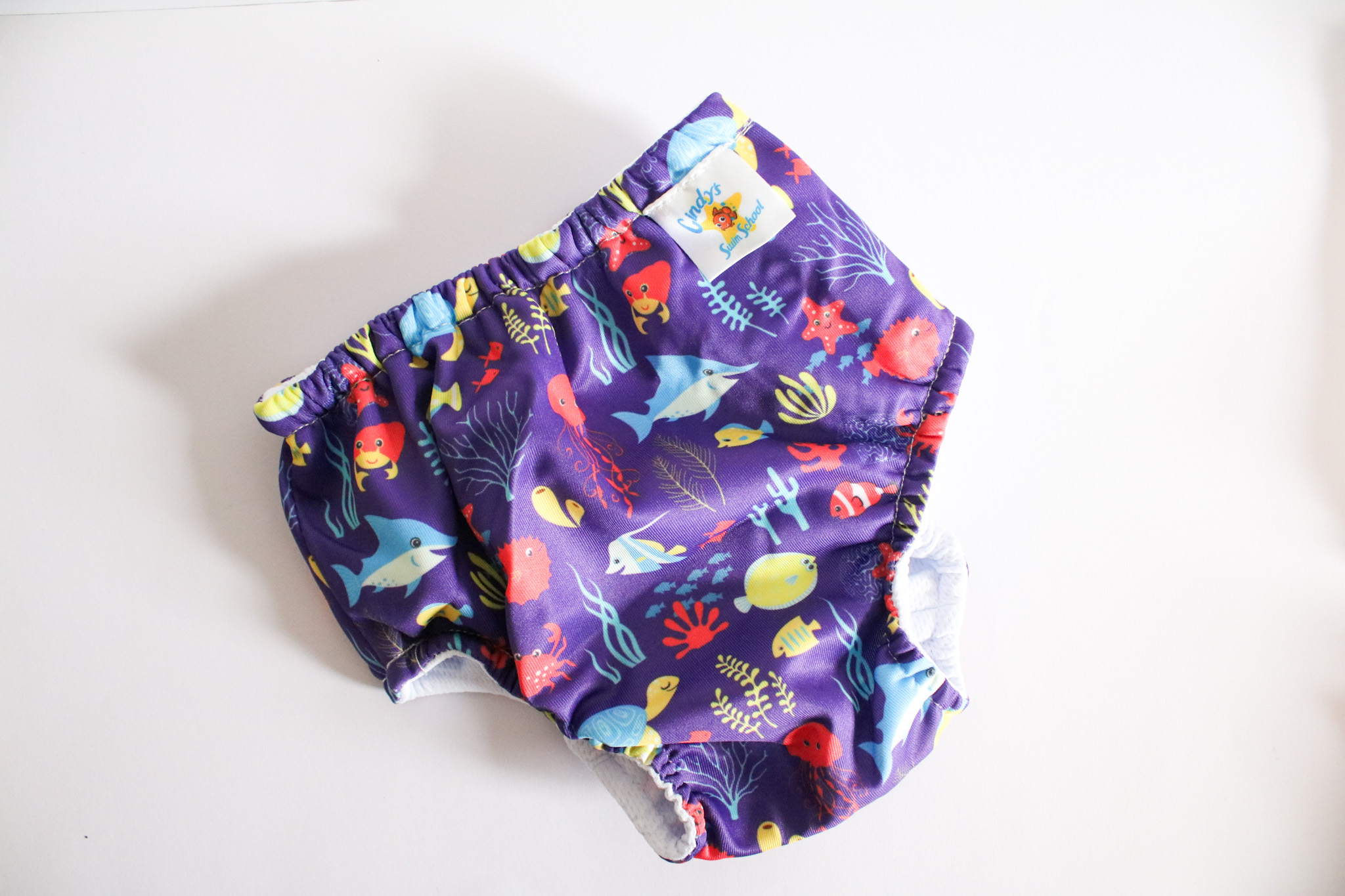
The reuseable water nappy fits comfortably underneath the neoprene water shorts.
£8.99
Can my baby swim with dry skin or eczema?
Yes, your baby can swim. Most pools are chlorinated to keep all swimmers safe and although this may dry the skin out a little, there are simple things we can do to combat this.
Top tips
- Apply a layer of a non-soluble creme, for example Vaseline, before swimming.
- Wear a rash vest or swim in an all-in-one over the neoprene nappy.
- Shower and apply cream immediately after swimming.
Can my baby swim with reflux?
Yes, learning just a few tricks will allow your baby to still enjoy all the fun to be had in the swimming pool. Be sure to tell your teacher at your first swimming lesson and they will keep an eye out for what kind of reflux response your baby has and assist you accordingly.
What if my baby screams in their lesson?
Like everything we do with babies, sometimes babies will cry or scream. This is completely normal and your teacher will be experienced with babies crying. Usually we will set a few toys out in a quieter spot in the pool to let you and your baby get used to the water while distracting them from the new surroundings. Once your baby has settled the teacher will bring you into the exercises in the lesson.
Please remember, if your baby cries, that is fine. Keep reassuring them, they are just expressing themselves. Your baby swimming teacher knows this, so don’t be upset or embarrassed if your baby screams. We have been there too! Simply stay calm and give them a hug and distract them with a toy… in no time they will love the water!
Top tips
- Bath time is always an extension of your lessons. Singing the same songs and doing some of the excercies at home too will make swimming part of their daily routine.
- Be calm and relax. If you’re not feeling at ease, or feel all anxious in the lesson, please let your teacher know. They will be happy to talk you through anything you need and explain what we are doing anything in the lessons and why.
- Have fun showing your baby the water is fun! Blow bubbles, splash, play. This will set the foundation that water and swimming are fun.
How long should babies stay in the water?
We find 30 minutes to be the perfect amount of time for babies to enjoy their lessons without getting over tired. Some younger babies may get very tired in the first couple of weeks. We have definitely had a few fall asleep during twinkle twinkle!
Very quickly your baby will start to recognise the structure of the lesson and get very excited about their favourite parts.
Because babies do a lot of movement and exercise during their lessons, more generally than younger babies would do outside of the pool, you may find they will sleep very well after swimming!
How much do baby swimming lessons cost?
Baby swimming lessons vary in price based on location, ratio of baby to teacher, and teacher training / experience.
At Cindy’s Swim School, we pride ourselves on making swimming safe, fun and enjoyable, and we keep our parent and baby classes to a 4:1 ratio. This enables social interaction for babies and parents while still keeping the class small and friendly, without too many distractions in the lesson.
To make baby lessons as affordable and accessible as possible, we’re pleased to offer a monthly subscription which spreads the cost evenly over 11 months of the year. The monthly subscription is £85 (December 2024).
Look out for promotional pricing from time to time as well: follow us on social media to keep updated with these.
We’ve made it easy for you and put everything you need for baby swimming lessons together in one place with our baby swim kit.
Our parent and baby swim kit bag includes an attractive, sturdy tote bag, a reusable nappy, a neoprene nappy for outer wear, a cute and cuddly animal towel for your baby, and a fun, mould-free floaty toy.
Bundle Save!

